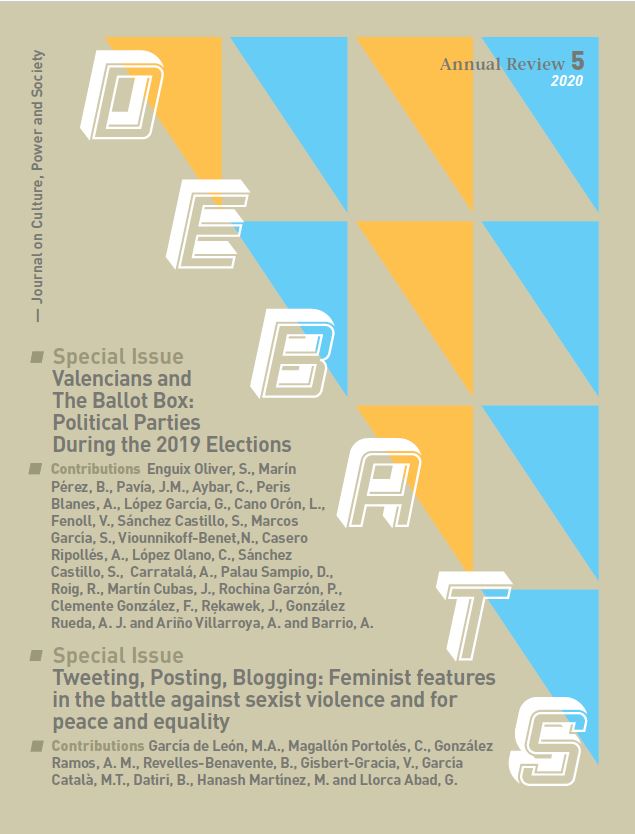Presentation of the Monographic Issue. Tweeting, Posting, Blogging: Feminist features in the battle against sexist violence and for peace and equality
Resumen
Presentation of the Monographic Issue. Tweeting, Posting, Blogging: Feminist features in the battle against sexist violence and for peace and equality
Descargas
Citas
Anderlini, S. N. (2018). Challenging Conventional Wisdom, Transforming Current Practices: A Gendered Lens on PVE, Transforming Current Practices. In B. Austin and H. J. Giessmann (ed.), Transformative Approaches to Violent Extremism. Berlin: Berghof Foundation.
Bloom, M. (2011). Bombshell: Women and Terrorists. London: Hurst.
Bunch, C. (2001). Women’s Human Rights: The Challenges of Global Feminist andDiversity. In M. DeKoven (ed.), Feminist Locations: Global and Local, Theory and Practice. New Brunswick: Rutgers.
Castells, M. (2012). Networks of Outrage and Hope. London: Cambridge Polity Press.
Crenshaw W., K. (1989). Demarginalizing the Intersection of Race and Sex: A Black Feminist Critique of Antidiscrimination Doctrine, Feminist Theory and Antiracist Politics. University of Chicago Legal Forum, 1989, Article 8.
Collins, P. H. (2000). Black Feminist Thought: Knowledge, Consciousness and the Politics of Empowerment. New York: Routledge.
Chamberlain, P. (2017). The Feminist Fourth Wave: Affective Temporality. Palgrave Macmillan.
Dean, J. and Aune, K. (2015). Feminism Resurgent? Mapping Contemporary Feminist Activisms in Europe. Social Movement Studies, 14(4): 375-395.
Friedman, E. J. (1995). Women’s Human Rights: The Emergence of a Movement. In J. S. Peters and A. Wolper (1995), Women’s Right, Human Rights (p. 18-35). New York: Routledge.
Friedman, E. J. (2005). The Reality of Virtual Reality: The Internet and Gender Equality Advocacy in Latin America. Latin American Politics and Society, 47, 1-34.
Haraway, D. (1988). Situated Knowledges: The Science Question in Feminism and the Privilege of Partial Perspective. Feminist Studies, 14(3), 575-599.
Hooks, B. (1986). Ain’t I a Woman: Black Women’s Rights Feminism. London: Pluto Press.
Khoja-Moolji, S. (2015). Becoming an ‘Intimate Publics’: Exploring the Affective Intensities of Hashtag Feminism’. Feminist Media Studies, 15(2), 347-350.
Leatherman, J. L. (2014). Violencia sexual y conflictos armados (Ana and Maria Villellas,translation). Barcelona: Edicions Bellaterra.
Magallón, C. (2010). Decidir en los procesos de paz, un derecho de hombres y mujeres. ¿Qué ha aportado la Resolución 1325 del Consejo de Seguridad? Papeles de relaciones ecosociales y cambio global, 109, 45-56.
Magallón, C. (2012). Contar en el mundo. Una mirada sobre las relaciones internacionales desde las vidas de las mujeres. Madrid: Horas y horas.
Massey, D. B. (1994). Space, Place, and Gender. Mineápolis: University of Minnesota Press.
Maxfield, M. (2016). History Retweeting Itself: Imperial Feminist Appropriations of ‘Bring Back Our Girls’. Feminist Media Studies, 16(5), 886-900.
Mohanty, C. T. (1984). Under Western Eyes: Feminist Scholarship and Colonial Discourses. Boundary 2, 12(3), 333-358.
Rovira, G. (2017). Activismo en red y multitudes conectadas: Comunicación y acción en la era de Internet. Barcelona: Icaria.
Sassen, S. (2007). Una sociología de la globalización. Buenos Aires: Katz Editores.
Sassen, S. (2015). Expulsiones. Buenos Aires: Katz Editores.
Segato, R. (2016). La guerra contra las mujeres. Madrid: Traficantes de sueños.
Descargas
Publicado
Cómo citar
Número
Sección
Licencia
Sin perjuicio de lo dispuesto en el artículo 52 de la Ley 22/1987 de 11 de noviembre de Propiedad Intelectual, BOE del 17 de noviembre de 1987, y conforme al mismo, los autores o autoras ceden a título gratuito sus derechos de edición, publicación, distribución y venta sobre el artículo, para que sea publicado en Debats. Revista de cultura, poder y sociedad.
Debats. Revista de cultura, poder y sociedad se publica bajo el sistema de licencias Creative Commons según la modalidad «Reconocimiento - NoComercial (by-nc): Se permite la generación de obras derivadas siempre que no se haga un uso comercial. Tampoco se puede utilizar la obra original con finalidades comerciales».
Así, cuando el autor o autora envía su colaboración, acepta explícitamente esta cesión de derechos de edición y de publicación. Igualmente autoriza a Debats. Revista de cultura, poder y sociedad, la inclusión de su trabajo en un fascículo de la revista para que se pueda distribuir y vender.











